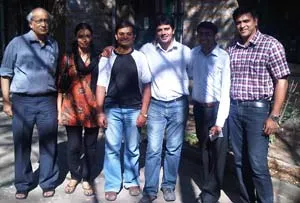Debabrata Bagchi, Sparsha Learning Technologies: Activity-based learning solutions for higher education

As Indians, we never miss an opportunity to complain about our corrupt politicians and our flawed education system. While the former may well be beyond redemption, there’s a lot of excitement around startups in the domain of education and more so, around the ones that are using technology to aid teaching and learning.In an attempt to throw light on this phenomenon, we at YourStory caught up with Debabrata Bagchi, an IIT Kharagpur alumnus and the founder-CEO of Sparsha Learning Technologies which is a product technology startup offering activity-based learning solutions. In this chat with YourStory, Debabrata speaks about the business idea behind Sparsha and his belief that simulation-based learning can change the face of higher education in India.
If someone asked you to tell them about Sparsha in about three sentences, what would you say?
Sparsha is a learning technology startup based out of STEP, IIT Kharagpur and Bangalore. It provides innovative solutions to increase the efficacy of the teaching-learning process. We are the first in the country to offer immersive learning solutions using simulations, specially targeting the higher education industry.
How is Sparsha different from other e-learning technology firms?
While most e-learning companies targeting learners/teachers in higher education focus on developing tools as teaching or learning aids, they are mostly solving an incremental problem and are usually at the lower end of the technology ladder.

At Sparsha, we focus on increasing the quality of learning, teaching and assessments using simulations and align our solutions to address program outcomes through a competency driven approach. This is a more holistic top-down approach which really addresses the higher cognitive abilities through activity based learning. We like to take the learners’ abilities into account as well while presenting our solutions.How did the business idea for Sparsha come about?
There are so many colleges in India and other developing countries which lack adequate good faculty and definitive infrastructure. There is a need to improve the quality of learning there by using technology.
Also, in places where such facilities are already available, there is a need to understand how we can equip students with higher order cognitive skills. While students are focused more on learning by rote, there is a need for teachers to embrace new instruction methods, which can help a student increase his abilities to apply, analyze, design and create.
These kinds of problems prompted us to come out of our comfort zones and really try to create value for addressing these issues by not being very disruptive.
Tell us about your background.
I am Computer Science graduate from IIT Kharagpur. I was pretty much bitten by the startup bug right from the days I graduated out of Northwestern University in Illinois after my term at IIT. My first stint was with a high-level synthesis startup in Schaumberg where I was one of the early developers. We were developing products which enabled designers to architect their systems in high-level languages like MATLAB.
I came back to India and worked with startups in Noida and Bangalore where I architected, designed, deployed and managed multiple products across cross-functional teams. This was primarily in the electronic design automation space. I was heading the engineering for a firm here in Bangalore for a couple of products in low-power synthesis and verification, which got acquired by Synopsys – which is the leading company in this space.
At Synopsys, I was responsible for product architecture, vision and roadmap, research and development of low power static and simulation based verification solutions and led a cross-functional team of R&D Engineers, GUI developers and PV to execute cutting edge solutions for low power verification. I was also Principal Investigator to various low power projects with academia during that time.
I have published multiple papers and patents in this area and primarily have been a product guy all my life. Very recently, I have also been working with IIIT (International Institute of Information Technology), Bangalore as a consultant to organize teacher training programs in “Effective E-Teaching and Learning” under Department of Information Technology, aimed at facilitating teachers of Computing Departments to design and conduct courses in the area of Computing using educational technology in the framework of Washington Accord.

Let us know about the tie-ups that you have. Is there acceptance for your concept? Can you give us some incidents to illustrate the same?Yes, we have tied up with top publishers in the higher education (HE) industry to take our product further and we are working with device/tablet OEMs to bundle our learning apps with devices. We have also signed strategic partners who already have a footprint in the HE market to cross-sell our offerings.
We also have our internal sales team and we have found acceptance is several higher education institutes in the country like ETI (Air Force), Department of Electronics Sciences, University of Pune, etc.

Very recently, we concluded an exercise with Mount Carmel College (Autonomous) in Bangalore, where an entire two-credit course based on active learning and design using our platform was served and learning outcomes were measured. Based on the great feedback, we are planning more certification and credit courses aligned with the curriculum there.Where do you see e-learning and Sparsha five years from now?
I see technologies like augmented reality, immersive environments really taking centre stage for learning and institutes completely realizing the value of pedagogy through technology to increase to quality of learning.
I also see devices like tablets becoming very popular and become de-facto delivery devices. We see Sparsha playing an active role in making this happen through technology and enabling teachers to move away from being information suppliers to facilitators in the learning process. We want Sparsha to take the lead and establish a global footprint to make this happen.
What is Sparsha's revenue model?
Sparsha creates activity based learning courseware using simulations and delivers that directly to learners. Sparsha has a subscription based model in a “per course, per student” basis. It sells this directly to engineering colleges, degree/science colleges/polytechnics through its own team or though its partners. It is also trying to reach the learners directly though publishers, devices, workshops and online business models.
As an entrepreneur, what are your joys? What are the challenges?

There are quite a few challenges in the market that we are trying to address. Right from the fact that, majority of students in a regular class are non-learners, the challenge is to effectively convert most of them to learners. The challenge lies in delivering the solutions in a cost effective manner without compromising on addressing the learning outcomes, given that this market is very price sensitive. So, there is a need to think out of the box as traditional scaling up methods are not going to work.
Tell us about the team at Sparsha. Are you looking at hiring?
Today, Sparsha is driven by a small, extremely potent team. The co-founders and advisors are IIT and IIM graduates and senior professors from premier institutes such as IIT and IISC.
My co-founder, Kapil Kaushik, is a graduate from IIT Delhi. He used to be part of the technical team at Magma Design Automation before we started Sparsha. Shivoo Koteshwar, one of our advisors and mentors, is a Director of the Implementation group at Synopsys. Shivoo’s from IIM Bangalore and he used to work with Intel before joining Synopsys. Apart from Shivoo, we also have on board Prof. Anup Kumar Ray, a visiting faculty at IIT Kharagpur as a director and mentor.
We also have full-time developers working out of Bangalore and we are currently looking at expanding our team to ramp up our sales, development and support functions.
How has the journey been so far?
It’s been phenomenal, actually. We are working hard to continuously improve the product. We got some very interesting feedback from our attempt at Mount Carmel. We even presented a scientific paper on how our platform, iLearnMore, increases learning and retention at the Indian Science Congress 2011.
We’ve also been lucky to get some great advisors like Dr. Swami Manohar, the Managing Director of Limberlink Technologies and Dr. Parameshwar Iyer, a Principal Research Scientist with IISC Banagalore. We’re benefitting from their expertise and understanding of the technology involved and the future looks bright for Sparsha.
We at YourStory wish Debabrata and the entire team at Sparsh much success. To know more about this exciting product tech startup in the e-learning space, check out http://www.sparsha-learning.com/. Also, do let us know what your think of this story. You can write to us at[email protected].
Sriram Mohan | YourStory | 28th March 2011 | Bangalore






